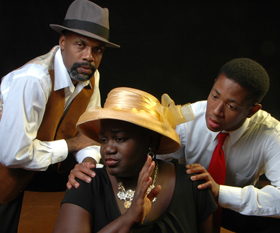
The ETA Creative Arts Foundation was conceived as a self-contained organization, developing original scripts through its education and training programs, and then performing them under the supervision of artists affiliated with its teaching staff. The slate for their upcoming 2012-13 season, however, reads like a history of African-American Theater, with plays ranging from 1954 to 2007, each selected by the production's director.
Explains ETA Producing Director Kemati Porter, "This season's theme was born of a wish expressed by directors playing a part in in ETA's history to resurrect works by legendary African-American playwrights that might not be offered in other venues."
Runako Jahi is just happy to be directing The Amen Corner, James Baldwin's 1954 tale of a storefront preacher's crisis of faith. "Baldwin made a point of creating complex characters who were flesh-and-blood, who struggled in a most authentic way to find purpose in their lives.His love and respect for humanity/justice rang true in not only his novels, but his essays and plays as well. Directing his classic has been my dream project for over ten years. I'm grateful to finally do it."
Ceremonies In Dark Old Men dates from 1969, but Vaun Monroe sees no obstacle to audiences in 2012 responding to the "brilliant, complex and ruggedly masculine" themes invoked by author Lonne Elder III. "The characters are trapped in rituals that give them some relief from their economic and spiritual imprisonment, but also rob them of their ability to define themselves or determine their own lives. You can read the shooting count any Monday morning and see that this is a condition that we still grapple with today."
Mignon McPherson Stewart's attraction to the plays of Alice Childress (whose reputation as a female playwright of color is too often eclipsed by that of Lorraine Hansberry) was first sparked by Wine In The Wilderness, Childress' 1969 critique of the sexism prevalent in the rising black empowerment movement. It will be performed as a companion piece to Florence, written in 1950, which recounts a mother's ambivalence over her daughter's career decisions. Declares Stewart, "[Childress] confronts socio-political issues—in particular, how our ability to see others is limited by our preconceptions—with honesty and humor, writing about real people in real interactions." She smiles, "I don't think that members of ETA's audience will have any trouble recognizing these people."
Cheryl West's 2002 play, Jar The Floor, introduces a group of women supporting (and sometimes clashing with) one another through troubled times—a theme Ilesa Duncan finds to be timely nowadays. "The specificity of family dysfunction is deeply rooted in the African-American experience. In these difficult economic times, West's play continues to speak to audiences because the filial dynamic hasn't really changed—but she finds the comedy in it, even as she comments on their ills."
Katori Hall's 2007 Hoodoo Love, directed by Artisia Green, brings the season's chronology up to the present, despite its setting in Memphis during the 1930s. "African-Americans are very informed by the folk customs passed along through slave culture, and music is a universal language," Green observes, "The field hollers became the blues by which Hall's two struggling main characters overcome sorrow and pain to pick up the pieces of their lives. It also provides us with recognition—we find ourselves remembering the things our mothers, or grandmothers, used to tell us, and saying, 'ah-ha, that's where it came from!'."
ETA's season takes us from a storefront church to a ghetto barber shop, from an artist's studio in Harlem to a cozy home outside Chicago, through times of economic squalor, times of social revolution, and times of domestic tension, on a journey encompassing more than half a century of stubborn endurance and courage. Can anyone deny the potential of this exciting upcoming year?
The Amen Corner opens September 13. Visit www.etacreativearts.org for information on other productions.
Mary Shen Barnidge
Contributing Writer

 Follow Us On Twitter
Follow Us On Twitter